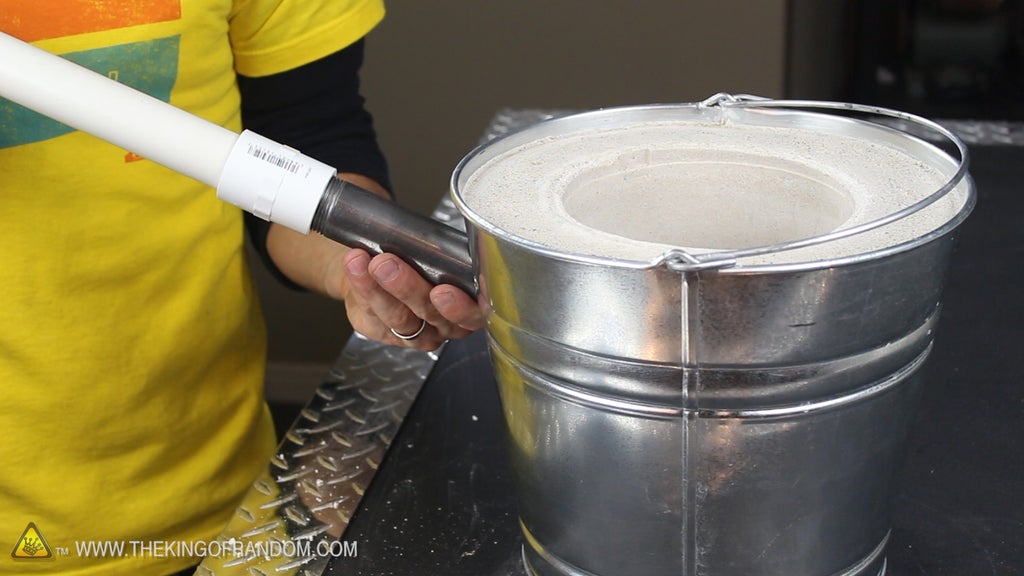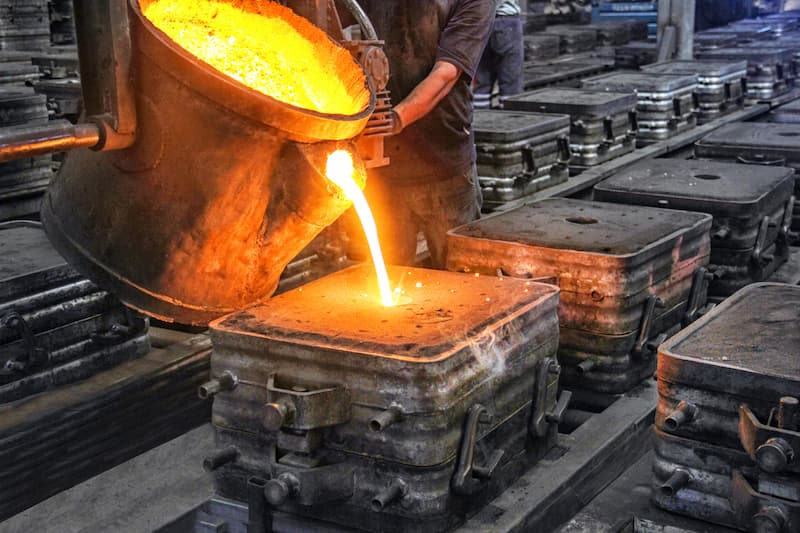Time-Tested Metal Casting Techniques That Still Inspire Modern Foundries
Wiki Article
A Comprehensive Guide to Metal Casting: Advantages and Solutions Offered by Foundries
Metal casting is a critical procedure in different industries, supplying many advantages with the services of factories. These facilities transform liquified metal right into accurate and resilient components, dealing with particular client demands. By employing sophisticated technologies, factories ensure quality and performance in manufacturing. The details of metal casting and the diverse strategies involved elevate essential concerns concerning its duty in contemporary production. What innovations lie ahead in this crucial area?Comprehending the Metal Casting Process
The metal casting process is an essential method made use of in making to develop intricate shapes and components. This approach entails putting molten metal right into a mold and mildew created to develop the preferred object. The process starts with pattern production, which offers as a theme for the mold. Metal Casting. Different materials, such as sand, metal, or ceramic, are used for mold-making, relying on the certain demands of the casting
Once the mold and mildew is ready, molten metal is put right into it and allowed to cool and strengthen. After solidification, the mold is removed, revealing the actors part. Different techniques, consisting of sand casting, investment casting, and die casting, are used, each fit to different applications and products. Quality assurance steps, such as assessments and testing, are vital to assure the last item satisfies requirements. In general, the metal casting process plays a crucial duty in producing components for markets varying from vehicle to aerospace.
Key Conveniences of Metal Casting
Metal casting provides significant benefits that make it a preferred manufacturing method in different sectors. Its style adaptability and precision enable elaborate forms, while affordable automation enhances performance. Additionally, the adaptability and strength of materials used in casting add to the durability of the end products.Style Versatility and Accuracy
Releasing exceptional layout flexibility and precision, metal casting enables designers and developers to create detailed forms and attributes that would certainly be difficult or impossible to attain with various other making approaches. This capability makes it possible for the production of complex geometries, internal structures, and great information that boost item performance and visual appeals. Furthermore, different casting methods, such as sand casting, investment casting, and die casting, give more options for modification, accommodating diverse material properties and project demands. The versatility of mold and mildews allows adjustments during the style stage, simplifying the change from principle to last product. Eventually, metal casting sticks out for its capability to provide high-precision components, making it a vital procedure in markets varying from automobile to aerospace and beyond.Affordable Automation
Cost-effective automation stands as one of the key advantages of metal casting, allowing manufacturers to produce huge amounts of elements at a lower price each. This performance develops from the capability to create detailed mold and mildews that can be reused multiple times, substantially lowering arrangement and functional costs. In addition, metal casting procedures, such as sand casting and die casting, permit high throughput, making it viable to satisfy the demands of large-scale manufacturing runs. The minimized material waste and energy usage even more enhance expense savings, making metal casting an attractive choice for industries requiring bulk components. On the whole, the cost-efficient nature of metal casting settings it as a favored technique for producers going for financial effectiveness in their production processes.Product Adaptability and Stamina
Among the standout attributes of metal casting is its exceptional material versatility, which permits for making use of a broad range of metals and alloys. This flexibility enables makers to select products that best fit their particular applications, from light weight aluminum and bronze to iron and steel. Each metal provides one-of-a-kind residential properties, including varying degrees of strength, rust resistance, and thermal conductivity. Metal casting can generate elements that satisfy rigorous efficiency requirements across diverse markets, such as auto, aerospace, and construction. Additionally, the stamina of actors steels can be boosted through various treatment processes, making sure resilience and durability. Metal Casting. On the whole, the combination of material adaptability and inherent toughness makes metal casting a favored option for creating premium elementsTypes of Metal Casting Techniques
Metal casting encompasses a selection of strategies that provide to different manufacturing needs and product homes. Typical methods consist of sand casting, which makes use of a sand mold for complex shapes, and financial investment casting, known for its precision and surface finish. Pass away casting is an additional strategy that uses high-pressure shot of molten metal into mold and mildews, suitable for automation of small parts.Covering molding uses a quicker alternative, using a resin-coated sand to develop thin-walled mold and mildews, while lost foam casting permits detailed styles without the need for a core.
Additionally, continual casting is used for producing lengthy sections of metal, such as bars or sheets, by strengthening liquified metal in a constant process. Each strategy is and offers one-of-a-kind benefits chosen based on factors like the required detail, manufacturing volume, and material type, making sure exceptional outcomes in metal manufacture across numerous markets.
The Role of Foundries in Metal Casting
Foundries play a crucial duty in the metal casting process, working as the facilities where liquified metal is transformed right into completed products. These specialized facilities are outfitted with the essential devices and modern technologies to manage various steels, making sure top notch results. Factories are accountable for numerous important features, consisting of melting the metal, putting it into molds, and permitting it to solidify.Additionally, they preserve rigorous safety and ecological criteria to safeguard employees and lessen eco-friendly effect. Skilled service technicians and designers collaborate to maximize casting processes, improving performance and decreasing waste. Factories also participate in high quality control measures, guaranteeing that the end products meet particular tolerances and specs. This quality control is vital for sectors that depend on accurate elements, such as auto and aerospace. As an outcome, foundries add considerably to the overall manufacturing landscape, enabling innovation and growth across various industries.
Customized Metal Casting Solutions
Personalized metal casting services offer tailored design services that satisfy particular customer requirements. These services also provide material option knowledge, making sure the appropriate metal is chosen for the preferred application. Such versatility and understanding improve the overall quality and efficiency of the end product.
Customized Style Solutions
Customized design options in metal casting give producers with the flexibility to develop parts that satisfy details performance and aesthetic demands. Factories supply personalized solutions that allow customers to specify dimensions, forms, and surface area finishes to accomplish wanted outcomes. This personalization procedure frequently includes page collaboration between developers and designers, guaranteeing that the last items straighten with operational needs and market criteria. Advanced technologies, such as computer-aided design (CAD) and simulation software application, allow specific modeling and screening of components before production, boosting and minimizing errors effectiveness. By leveraging customized layout remedies, businesses can optimize functionality while decreasing waste and expenses, eventually resulting in a much more one-upmanship on the market. This versatility is necessary for markets requiring unique applications and requirements.Product Choice Competence
When selecting products for metal casting, experience plays a vital role in making sure that the ideal option straightens with both performance needs and cost-effectiveness. Factories employ skilled experts who recognize the homes of different metals and alloys, enabling them to recommend excellent materials for details applications. Elements such as strength, deterioration resistance, and thermal conductivity are very carefully thought about to fulfill the customer's demands. Additionally, market fads and improvements in product science educate these decisions, allowing shops to stay affordable. By leveraging their competence, shops can assist customers in guiding via complex material alternatives, ultimately causing improved product high quality and reduced production expenses. This customized expertise is vital for accomplishing effective end results in custom metal casting services.Quality Assurance in Metal Casting
use this link Quality assurance in metal casting is crucial to ensure that the end products fulfill the called for requirements and performance standards. Foundries utilize a selection of strategies and methodologies to guarantee the highest possible quality of actors parts. This process begins with strict material evaluations, confirming that basic materials follow market criteria. Throughout the casting process, real-time surveillance and screening are carried out to examine criteria such as temperature level, mold and mildew integrity, and dimensional accuracy.
Applications of Metal Castings Throughout Industries
Metal castings play a critical function in numerous markets, offering as the backbone for countless applications. In the vehicle sector, cast elements such as engine blocks and transmission housings are needed for vehicle efficiency and reliability. The aerospace market relies upon precision spreadings for crucial parts that guarantee security and performance in flight. In addition, the construction market makes use of metal castings for fixtures, installations, and architectural elements, improving the durability of buildings and framework.Furthermore, the energy field gain from castings made use of in generator blades and other devices crucial for power generation - Metal Casting. The medical field also utilizes metal spreadings in instruments and devices, demonstrating the versatility of this manufacturing procedure. On the whole, metal spreadings are important to the performance and improvement of diverse industries, showcasing their significance in contemporary technology and facilities growth
Often Asked Questions
What Products Are Frequently Used in Metal Casting?
Common products used in metal casting consist of aluminum, iron, bronze, brass, and steel. Each material offers unique homes appropriate for different applications, enabling producers to choose the most effective choice based on weight, corrosion, and stamina resistance.The length of time Does the Metal Casting Refine Generally Take?
The metal casting process commonly takes a number of hours to a few days, depending on variables such as the intricacy of the style, kind of metal made use of, and the certain casting technique employed by the factory.
What Is the Ecological Influence of Metal Casting?
The environmental effect of metal casting consists of power consumption, discharges, and look at this web-site waste generation. Shops often carry out measures to alleviate these results, such as recycling products and utilizing cleaner modern technologies to reduce their environmental footprint.Can Metal Casting Be Provided For Small-Scale Projects?
Metal casting can without a doubt be performed for small-scale projects. Different shops accommodate such needs, providing tailored remedies that accommodate restricted manufacturing runs while preserving top quality and accuracy in the end products.What Are the Safety And Security Measures in Metal Casting Foundries?
In metal casting factories, precaution consist of individual safety devices, appropriate ventilation, training on devices use, emergency procedures, regular maintenance checks, and adherence to industry safety standards to decrease dangers connected with liquified metal and unsafe products.In addition, metal casting procedures, such as sand casting and pass away casting, enable for high throughput, making it practical to satisfy the demands of large-scale manufacturing runs. One of the standout features of metal casting is its impressive product adaptability, which enables for the use of a broad variety of steels and alloys. In addition, constant casting is used for generating long sections of metal, such as sheets or bars, by strengthening molten metal in a constant process. Foundries play an essential function in the metal casting process, offering as the facilities where molten metal is changed right into finished items. Typical products used in metal casting include light weight aluminum, iron, brass, steel, and bronze.
Report this wiki page